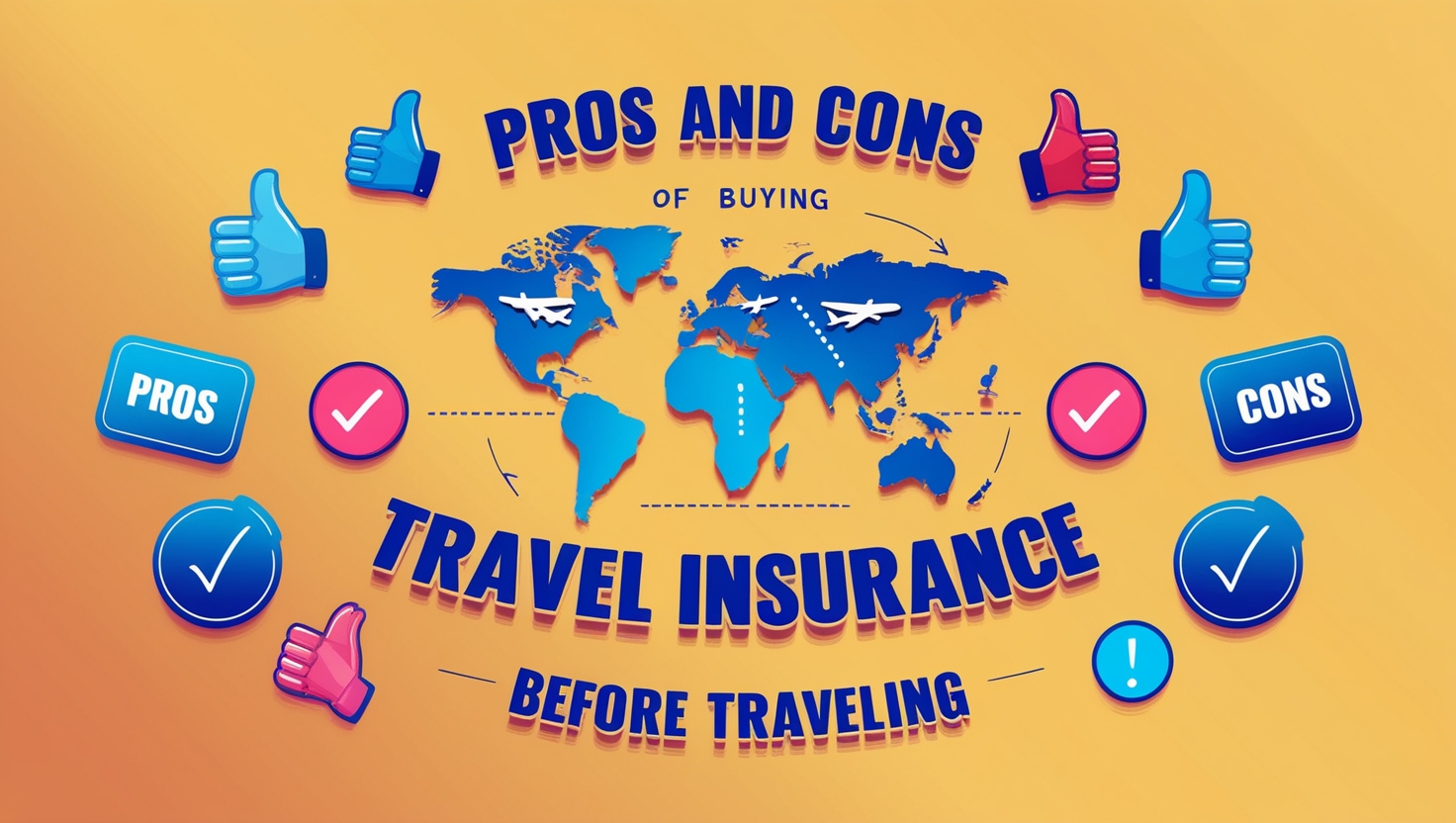 Introduction
Introduction
Definition of Travel Insurance
Travel insurance is a type of insurance designed to cover the costs and losses associated with traveling. It serves as a safeguard against various travel-related risks, providing coverage for medical emergencies, trip cancellations, lost luggage, flight accidents, and other unforeseen incidents.
Importance of Travel Insurance
In today’s unpredictable world, travel insurance has become an essential part of trip planning. It not only provides financial protection but also ensures peace of mind, allowing travelers to enjoy their journey without constant worry. With the right travel insurance policy, one can mitigate the risks associated with traveling, making it a crucial component of any travel plan.
Overview of Pros and Cons
While travel insurance offers numerous benefits, it also comes with its own set of drawbacks. Understanding the pros and cons of purchasing travel insurance can help travelers make informed decisions and choose the right policy that suits their needs.
Types of Travel Insurance
Single Trip Insurance
Single trip insurance is designed for individuals who plan to take one trip within a specified period. It provides coverage for that single journey, including medical emergencies, trip cancellations, and lost luggage.
Annual Multi-Trip Insurance
For frequent travelers, annual multi-trip insurance offers coverage for multiple trips within a year. This type of insurance is cost-effective and convenient, eliminating the need to purchase a new policy for each trip.
Backpacker Insurance
Backpacker insurance is tailored for those embarking on long-term travel or multiple destinations. It covers a wide range of activities and offers extended coverage durations, making it ideal for adventurous travelers.
Family Travel Insurance
Family travel insurance provides coverage for the entire family under a single policy. It includes benefits like medical emergencies, trip cancellations, and baggage loss for all family members, ensuring a hassle-free travel experience.
Senior Travel Insurance
Designed specifically for older travelers, senior travel insurance covers age-related risks and medical conditions. It offers comprehensive coverage, including medical emergencies, trip cancellations, and evacuation services.
Pros of Buying Travel Insurance
Financial Protection
Coverage for Medical Emergencies
Medical emergencies can occur at any time, and the costs associated with treatment in a foreign country can be exorbitant. Travel insurance provides coverage for medical expenses, including hospitalization, doctor visits, and emergency evacuation, ensuring travelers receive necessary care without financial strain.
Trip Cancellation and Interruption
Unexpected events such as illness, natural disasters, or political unrest can lead to trip cancellations or interruptions. Travel insurance reimburses non-refundable expenses, such as flight tickets and accommodation, providing financial relief in such situations.
Lost or Stolen Baggage
Losing luggage during travel can be a significant inconvenience. Travel insurance offers compensation for lost, stolen, or damaged baggage, allowing travelers to replace essential items and continue their journey smoothly.
Delayed Flights
Flight delays can disrupt travel plans and result in additional expenses. Travel insurance covers costs related to flight delays, including accommodation, meals, and transportation, reducing the financial burden on travelers.
Peace of Mind
24/7 Assistance Services
Many travel insurance policies offer 24/7 assistance services, providing support in case of emergencies. From medical referrals to travel advice, these services ensure travelers receive timely help, no matter where they are.
Support in Unfamiliar Situations
Traveling to a foreign country can be daunting, especially in emergencies. Travel insurance provides support and guidance, helping travelers navigate unfamiliar situations and ensuring they receive the necessary assistance.
Specific Coverage
Adventure Sports Coverage
For thrill-seekers, travel insurance offers coverage for adventure sports and activities. Whether it’s skiing, scuba diving, or bungee jumping, travelers can enjoy their favorite sports with the assurance of being covered in case of accidents or injuries.
Rental Car Coverage
Travel insurance can include rental car coverage, protecting travelers from potential damages or theft of rental vehicles. This additional coverage ensures peace of mind while driving in a foreign country.
Pre-existing Medical Conditions
Many travel insurance policies offer coverage for pre-existing medical conditions. This ensures travelers with chronic illnesses receive necessary medical attention without facing financial difficulties.
Cons of Buying Travel Insurance
Cost
Premium Costs
The cost of travel insurance can be high, especially for comprehensive coverage. Premiums vary based on factors like age, destination, and trip duration, making it essential for travelers to evaluate whether the benefits outweigh the costs.
Deductibles and Co-payments
Travel insurance policies often include deductibles and co-payments, requiring travelers to pay a portion of the expenses out of pocket. Understanding these costs is crucial to avoid unexpected financial burdens during a claim.
Exclusions and Limitations
Pre-existing Conditions
While some policies cover pre-existing conditions, others may exclude them. It’s essential for travelers to carefully read the policy terms to understand what is and isn’t covered.
High-Risk Activities
Certain high-risk activities, such as extreme sports or participation in professional events, may not be covered by standard travel insurance policies. Travelers should verify whether their planned activities are included in the coverage.
Coverage Limits
Travel insurance policies have coverage limits, which can restrict the amount reimbursed for specific claims. Understanding these limits helps travelers manage their expectations and plan accordingly.
Misleading Policies
Complex Terms and Conditions
Travel insurance policies can be complex, with intricate terms and conditions. Travelers may find it challenging to comprehend the coverage details, leading to potential misunderstandings and dissatisfaction.
Potential for Denied Claims
Not all claims are approved, and some travelers may face denied claims due to policy exclusions or insufficient documentation. Ensuring thorough understanding and proper documentation is vital to avoid such scenarios.
Case Studies and Personal Stories
Successful Claims Stories
Numerous travelers have benefited from travel insurance, with stories of successful claims for medical emergencies, trip cancellations, and lost luggage. These stories highlight the importance and value of having travel insurance.
Unsuccessful Claims Stories
On the flip side, some travelers have faced denied claims due to various reasons such as policy exclusions or lack of proper documentation. These stories serve as cautionary tales, emphasizing the need for thorough understanding and careful selection of travel insurance policies.
Real-Life Implications
Real-life implications of travel insurance can be profound, affecting travelers’ overall experience and financial stability. Learning from others’ experiences helps potential buyers make informed decisions.
Expert Insights
Quotes from Travel Insurance Experts
Travel insurance experts provide valuable insights into the importance of coverage, common pitfalls, and tips for choosing the right policy. Their expertise can guide travelers in making informed decisions.
Tips from Frequent Travelers
Frequent travelers share their experiences and tips on selecting and utilizing travel insurance. Their practical advice can help others maximize the benefits of their insurance policies.
Recommendations from Travel Agents
Travel agents often recommend specific travel insurance policies based on travelers’ needs and destinations. Their recommendations can simplify the selection process and ensure adequate coverage.
How to Choose the Right Travel Insurance
Assess Your Needs
Travel Destination and Duration
Different destinations and trip durations require varying levels of coverage. Assessing the specific needs based on where and how long you plan to travel is crucial in selecting the right insurance policy.
Planned Activities
Consider the activities you plan to engage in during your trip. Adventure sports or other high-risk activities may require specialized coverage.
Health Considerations
Evaluate your health status and any pre-existing conditions to ensure the travel insurance policy provides adequate medical coverage.
Compare Different Policies
Coverage Options
Compare different travel insurance policies to understand the coverage options available. Look for policies that offer comprehensive coverage for medical emergencies, trip cancellations, and other essential aspects.
Policy Costs
Evaluate the cost of different policies, including premiums, deductibles, and co-payments. Choose a policy that offers the best value for your money while meeting your coverage needs.
Customer Reviews
Read customer reviews and testimonials to gauge the reliability and customer service of the insurance provider. Positive reviews indicate a trustworthy and efficient insurance company.
Read the Fine Print
Exclusions
Carefully read the policy exclusions to understand what is not covered. This helps avoid surprises during the claims process.
Claim Process
Familiarize yourself with the claims process, including required documentation and timelines. Knowing this information in advance ensures a smoother experience if you need to file a claim.
Policy Limits
Understand the coverage limits of your policy, including maximum reimbursement amounts for different claims. This helps set realistic expectations and ensures adequate coverage.
When Travel Insurance Might Not Be Necessary
Domestic Travel
For domestic travel, existing health insurance and other coverages may be sufficient, making additional travel insurance unnecessary.
Short Trips
For short trips, the risks may be lower, and the cost of travel insurance may outweigh the benefits. Assessing the risk and potential costs can help determine if insurance is needed.
Existing Coverage through Credit Cards or Employer
Some credit cards and employers offer travel insurance as part of their benefits. Reviewing existing coverage can help decide if additional insurance is necessary.
Tips for Maximizing Travel Insurance Benefits
Purchase Early
Buying travel insurance early ensures coverage for trip cancellations or interruptions that may occur before the trip starts.
Keep Documentation
Maintain thorough documentation of all travel-related expenses and incidents. This helps streamline the claims process and ensures you have the necessary information to support your claim.
Understand the Claims Process
Familiarize yourself with the claims process, including required documentation and timelines. Knowing this information in advance ensures a smoother experience if you need to file a claim.
Use 24/7 Assistance Services
Take advantage of the 24/7 assistance services offered by your travel insurance policy. These services provide valuable support and guidance in case of emergencies.
Conclusion
Summary of Key Points
Travel insurance offers significant benefits, including financial protection, peace of mind, and specific coverage for various travel-related risks. However, it also has drawbacks such as cost, exclusions, and potential for denied claims.
Final Thoughts on Travel Insurance
While travel insurance may not be necessary for every trip, it provides essential coverage and support for many travelers. Carefully assessing your needs, understanding policy details, and choosing the right coverage can enhance your travel experience and provide invaluable protection.
Call to Action for Further Education
For further education on travel insurance, consult with travel insurance experts, read customer reviews, and thoroughly research different policies. Being well-informed ensures you make the best decision for your travel needs.


